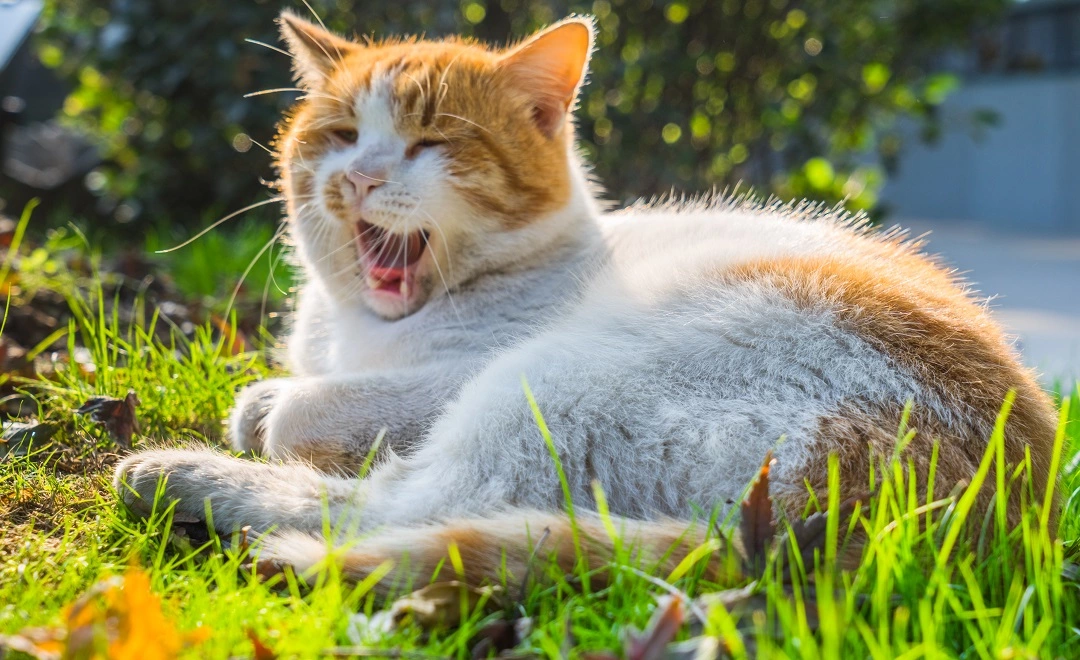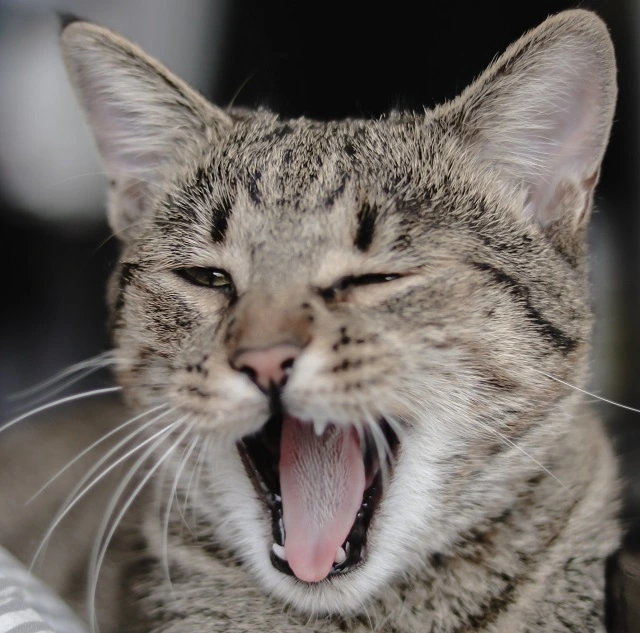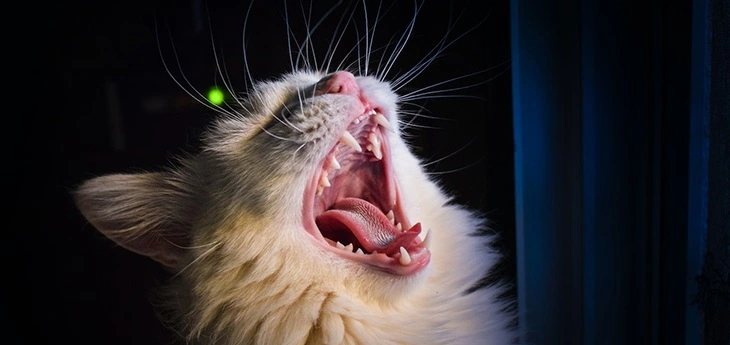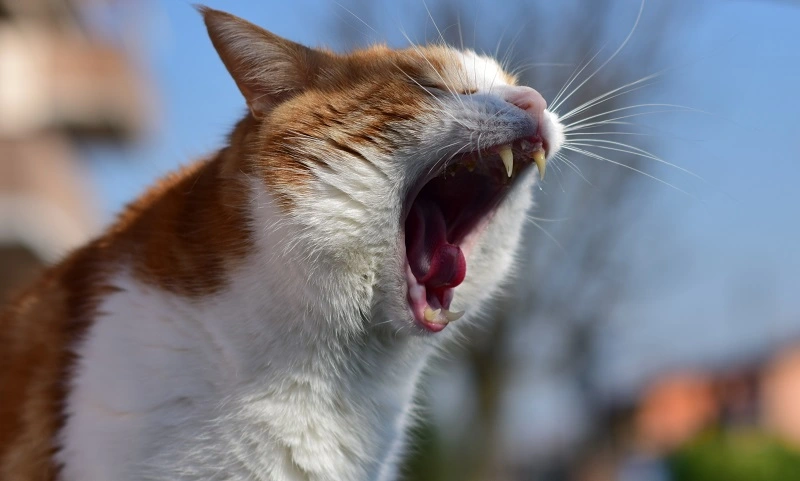5 Possible Reasons Why Your Cat Gags When Purring
Does your cat choke whenever it purrs? While such a reaction may look odd and alarming, there are possible explanations for why a cat gags when purring.
In this article, I discuss these potential reasons and what you can do if your pet suffers from them. Still, this post shouldn’t be considered a replacement for actual veterinary advice.

If you suspect your cat’s health is compromised, a veterinarian is always the best person to contact.
But if you’re curious and want to have an idea, the following reasons might explain your kitty’s unusual reaction to purring.
Why does my cat gag while purring?

1. Hairball
The most common reason behind gagging when purring is a hairball. As your cat grooms itself, it swallows loose hair, which will ball up inside the kitty’s tummy.
Your cat will retch, gag, and cough to vomit the hairball. Purring can worsen this irritation, which may explain your cat’s unusual gagging.
But aside from gagging, cats trying to bring up a hairball will also exhibit dry heaving. It’s pretty common and can happen once or twice a week, depending on how fluffy your cat is.
However, if the gagging happens every time your cat purrs, it’s best to rule out potential health problems. Your cat’s veterinarian is the right person to consult to ensure that your kitty is diagnosed and treated as early as possible.
2. Feline asthma
One of the hallmark signs of feline asthma is coughing, which appears as if your cat is gagging. Sometimes, your cat’s wheezing due to asthma might be mistaken as purring.
Moreover, a cat with asthma will have recurring bouts of wheezing, which can be accompanied by random gagging. If it happens often, I recommend that you bring your pet to the vet’s office for a proper checkup.
The following are the signs of feline asthma to watch out for:
- Labored breathing
- Breathing looks as if it’s coming from the belly and not the chest
- Wheezy breathing
- Frequent coughing that may appear like vomiting or gagging
Same with humans, allergens can trigger feline asthma. This includes pollens, smoke, dust, cat litter, and fumes. Please read here: How To Dispose Of Cat Litter Without Plastic Bags
Some cat grooming products can also trigger a feline asthma attack. If your kitty has been diagnosed with this condition, you must make lifestyle changes to keep the cat as comfy as possible.
3. Acid reflux
Cats can suffer from acid reflux just like humans do. It’s pretty common among kittens and senior cats, though adult kitties are not invincible to this problem.
According to veterinarians, cats also get uncomfortable heartburn when they have acid reflux. This will lead to gagging, vomiting, drooling, and difficulty swallowing.
In some cases, the kitty will have a nasal charge, and it will stick its tongue out. Some felines will have chronic unproductive cough during acid reflux.
You’ll also notice a change in the way the cat meows. Your pet will howl or meow loudly due to the pain it’s going through.
If you suspect your cat has acid reflux, I recommend calling the vet. Felines with this condition require proper medication to correct the problem.
4. “Overpurring”
Many cat owners theorize that some cats may purr too much and start irritating their throats. This could be the reason why they gag or cough after a long stretch of satisfying purrs.
I’ve known someone with a cat suffering from purring-related gagging, but it turned out to be okay. Vets don’t pathologize immediately, primarily if the cat isn’t exhibiting other serious physiological symptoms.
Overall, overpurring is primarily anecdotal and begs for actual scientific proof. Again, the vet is the right person to talk to.
5. Dusty litter
Lastly, you should consider whether your cat’s litter is too dusty. A dusty litter can irritate your pet’s respiratory system, causing gagging when purring.
Instead of the standard clay litter, consider switching to a silica-based type. It doesn’t have dust that may irritate your cat’s breathing.
Aside from that, silica litter does an excellent job of absorbing malodors. You can also use a single refill for a whole month without stinking.
However, silica litter isn’t suitable for all cats. The silica crystals can get stuck on your cat’s paws, and some silica litter products are too rough on the paw pads.
Other causes of gagging in cats

Aside from the conditions mentioned above, there are other causes of gagging in cats. These are not necessarily related to purring:
1. Eating too fast
When a cat eats too fast, it swallows large amounts of air and food at once. This can cause gagging and vomiting.
Also, your kitty will suffer from indigestion and other tummy troubles. Eating too fast can also lead to a condition called feline gastric dilatation-volvulus, though it’s extremely rare in cats.
To solve the problem, you should get a slow feeder for your cat. There are also slow-feeding bowls designed to prevent your kitty from making big bites of its food.
2. Ingesting toxic substances
Toxic substances will trigger your cat’s gag reflex as a protective response. It will also cause vomiting, diarrhea, and a slew of other life-threatening symptoms.
If you suspect your cat ate a toxic substance, you must call the vet or a pet poison hotline. This can be life-threatening, especially if it’s highly poisonous.
3. Swallowing foreign objects
Foreign objects dislodged in your cat’s throat will cause endless gagging. In most cases, your cat can regurgitate the object, much like it can vomit a hairball.
However, some cats may swallow an object too large to vomit. This may require a surgical procedure to prevent life-threatening consequences.
4. Respiratory infections
Respiratory infections are also notorious for triggering the gagging reflex of cats. Coughs and colds are to blame if your kitty suddenly becomes too nauseous.
The only way to stop this is to treat the root cause of the problem. Take your cat to the vet for proper examination and treatment.
5. Tight collar
Before you jump to any of the conclusions above, you must check how tight your cat’s collar is. Kittens grow fast; before you know it, they are already choking on their collars.
Simply adjusting the collar fit will make a big difference. It might be the solution your cat needs to stop the uncomfortable choking and gagging finally.
Why is my cat making gagging noises?
Gagging in cats is due mainly to hairball. Your cat is trying to vomit the accumulated loose fur out of its system, which is why the dry heaving and retching.
However, health issues like allergies, respiratory infections, airway obstruction, and asthma are also possible. Your cat’s vet can rule out these conditions after a thorough examination.
Why does my cat keep gagging like he wants to throw up?
If your cat is gagging and looks like throwing up, it’s trying to vomit a hairball. This is normal, and your kitty will be fine once it gets rid of the nasty hair lump.
This can happen several times a month. To help your kitty, you can switch to a diet that helps with hairball and digestion.
Should I be worried if my cat is gagging?

Gagging is very common in cats and all pets in general. It’s not usually a cause for concern unless accompanied by other symptoms.
You may want to consult the vet if your cat’s gagging often occurs and in rapid succession. But if it’s just a random gag, it can be harmless and triggered by environmental factors.
Conclusion
Gagging while purring can happen to cats due to a variety of reasons. Some are harmless, while others may need the expertise of a veterinarian.
Overall, gagging from time to time shouldn’t cause panic. It’s all about observing your cat and involving the veterinarian if things go out of hand.
Remember that the vet is the best person to diagnose and treat your feline’s condition. Avoid home remedies because they may cause more problems down the line.
